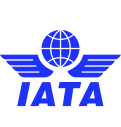
A sustainable IATA for a sustainable Air Transport Industry
We commit to driving sustainability within IATA by implementing the best practices that minimize our impact on the environment and add social value. We also strive to carry on with our mission to represent, lead and serve the airline industry under strong governance principles that ensure transparency and accountability in our daily work.
Our people
Diversity, equity & inclusion
These are fundamental to our business success, this is why we have strong internal non-discrimination policies. With over 1,300 employees representing 104 nationalities in 54 countries all around the world, we are a totally international workplace, and our overall gender balance is 53% male and 47% women.
25by2025
Our goal is to have 25% women among our senior leaders by 2025. We also strive to become a role model for our people to reflect our diversity and inclusion priorities by building a team with varied backgrounds, perspectives and skills. The more inclusive we are, the better we will be able to represent, lead and serve the airline industry. We encourage our members to adopt 25by2025 too.
Salaries
In 2022, we received Global Equal Salary Certification, one of only two companies who achieved global certification. We are proud of this achievement as it not only looks at salaries but also at our internal policies and practices to ensure we have the structure and culture in place to support equity between men and women.
Fly for freedom
This is an IATA-wide CSR initiative where our staff can devote time or money to a cause that is close to their hearts. In addition to donating money, employees can volunteer and take part in charity initiatives across the globe. It's run in partnership with Alaya. The recent focus was on supporting to the people of Ukraine.
Our business
Data privacy and security
We respect and protect your data. To that extend, we and our service providers are committed to comply with the highest data security and data privacy standards, in line with not only state-of-art practices but also with data privacy requirements.
Website accessibility
We are determined to improve our website accessibility to facilitate access to our content to users with disabilities. In the fall of 2022, our score against W3C standards was 70.9%, and we are working on content and technology improvements to improve it as far as possible by end 2022.
Our footprint
Our offices
We strive to reduce our offices’ and staff environmental footprint. We have equipped our Geneva HQ with solar panels and charging stations for electric cars. And by end 2022, we'll be using AI to manage heating and air conditioning. We also encourage our staff around the world to use public or alternatives means of transportation when possible, and are looking at other ways to reduce our footprint in our local offices.
Recycling
We have been segregating different types of waste in accordance with local policies and recycling capacities. At our Geneva HQ, where our recycling capacity is the highest, we have recyclable plates and cutlery in our canteen. Annually, in Geneva alone, we collect more than 200 kilograms of PET bottles, 4,8 tons of paper as well as 1,200 kilos of glass bottles.
Travel offsetting
We offset all our staff air travel. To compensate for our footprint, we have invested in two high-quality carbon reduction projects: a smart agriculture and sustainable land use project in Malawi, and a hydroelectric project in the Uttarakhand province in India.
.
Our social & environmental commitments together with the air transport industry
Human trafficking
An estimated 24.9 million people live in conditions of modern slavery. It is likely that human trafficking uses the extensive reach of the air transport network. We work with our members to increase staff awareness and with governments to put in place reporting mechanisms for potential trafficking situations.
Travelers with disabilities
Air travel must be accessible to all passengers, particularly those with visible or invisible disabilities. We work with our members, airports and groups from the disabled community to eliminate barriers and enable an enjoyable and safe travel experience for all. More on our air travel accessibiity commitment.
Wildlife trafficking
The international illegal wildlife trade is estimated to be worth up to $23 billion a year, covering a broad range of endangered species. This trafficking depends on an interconnected transport network involving passenger and cargo airlines. We work with the aviation industry to support enforcement agencies in combating wildlife trafficking.
UN SDG
Air transport is at the heart of global economic growth. It creates employment, facilitates trade, enables tourism and supports sustainable development all around the world. Aviation has a role to play in 15 of the 17 SDGs, some in small ways and others with significant influence. See: Flying in formation (pdf) and Aviation: benefits beyond borders (pdf).

Working towards a sustainable aviation
Fly Net Zero: the commitment of airlines to achieve net zero carbon by 2050.
We guide our members on their journey to net-zero carbon emissions and sustainable aviation. We do that by creating a conducive environment for change and securing the support of key stakeholders such as policymakers, investors, and other businesses. We also provide expertise, products, and services that facilitate the energy transition of aviation and help reduce airlines’ environmental footprint.
